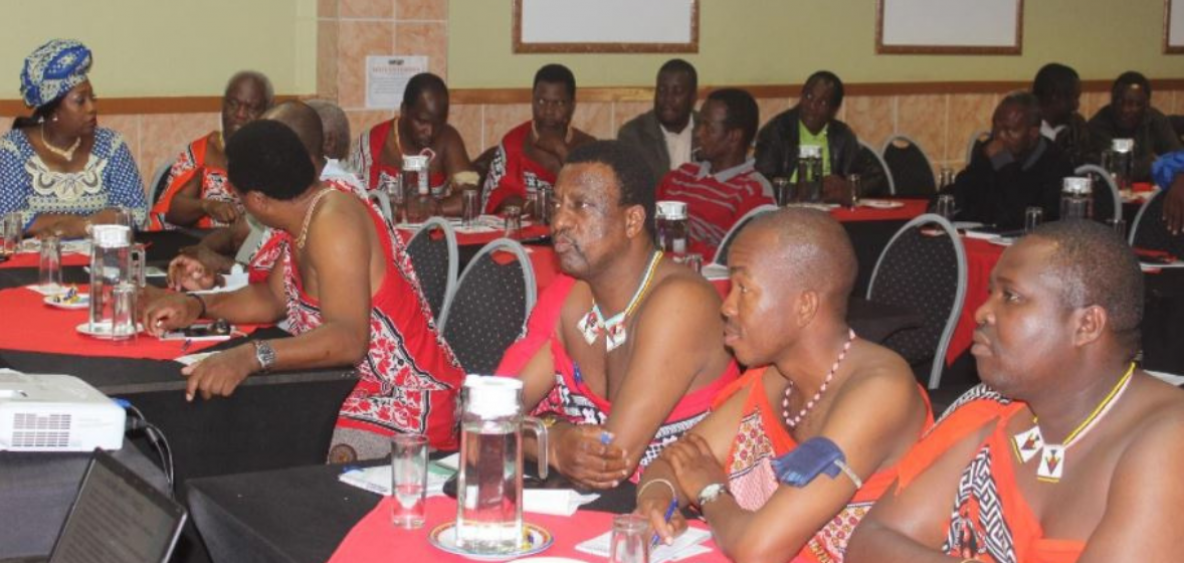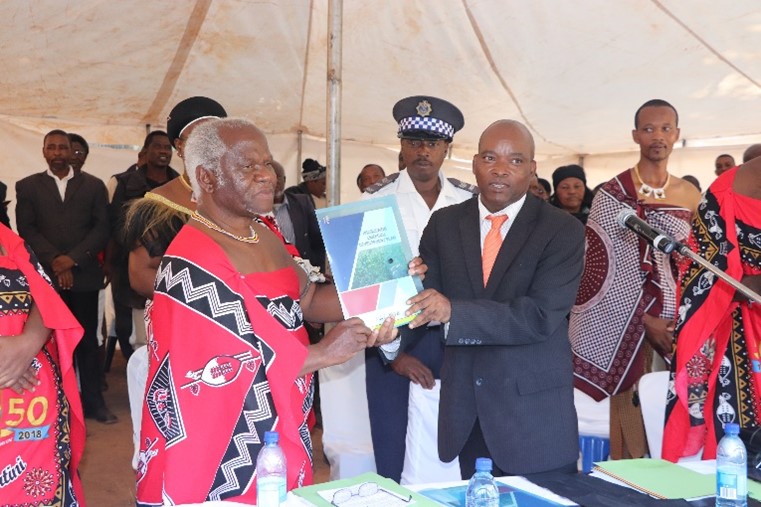 Traditional Authorities (Chiefs and Princes) working alongside the first female Regional Administrator (RA) in Eswatini. (Photo credit: Nontsikelelo Malindzisa, SMLP Senior Environment Officer)
Traditional Authorities (Chiefs and Princes) working alongside the first female Regional Administrator (RA) in Eswatini. (Photo credit: Nontsikelelo Malindzisa, SMLP Senior Environment Officer) Engaging traditional chiefs in eSwatini has been key to the success of the RFS project, working towards building infrastructure, capacity, and women’s empowerment in 37 chiefdoms.
Traditional chiefs in eSwatini are the decision makers, dispute resolvers, land allocators and cultural compasses for those residing in their chiefdom.
The RFS eSwatini project, Climate-Smart Agriculture for Climate-Resilient Livelihoods (CSARL), is implemented by the International Fund for Agricultural Development (IFAD) and the Eswatini Water and Agriculture Development Enterprise (ESWADE). The project is committed to advancing resilient and equitable livelihood options, increasing agricultural production, and stabilising landscapes through climate-smart agriculture (CSA) in 37 chiefdoms. Garnering support from traditional leaders through Chiefdom Development Plans (CDPs) has made achieving these goals possible through integrated approaches.
The Ngobolweni community is well into implementing their CDP, and Chief Dambuza Lukhele’s pride is proof that support is key.
In his own words, “the CDP is the greatest achievement of our community because it outlines basic development projects with challenging timelines, which is something vital since there have been a number of hindrances towards development in our area before, that were left unattended because such an instrument was non-existent.
“My sincere appreciation goes to ESWADE for bringing hope and innovation to our community because this area boasts of a rich cultural history that can create eco-tourism opportunities which can immensely benefit the community,” concludes Chief Lukhele.
Paulos Dlamini, chairman of the Chiefdom Development Committee (CDC), adds that, to date, about 370 households are benefitting from potable water supplied through a new water supply scheme. He explains how they have built capacity on development issues. “Once we were elected into the CDC, we were taken for a workshop which was quite an eye-opener for us because it taught us different things, from how to work together harmoniously to the basic executions of each one’s duty,” he says.
The Social Cohesion facilitation workshops and Training for Transformation highlighted the role of diversity in ensuring that all community members’ interests are represented in planning.
“We appreciate having the plan because it has harmonised and structured our aspirations,” continues Dlamini. “Through the CDP, we are now able to channel our focus to the right stakeholders and in also having timelines to our ambitious projects. We further appreciate the authorities of our area, in particular Chief Dambuza who is always supportive in everything we do.”
Dlamini goes on to explain how they have been able to successfully write a proposal to Micro Projects and receive assistance towards the construction of a secondary school. “When ESWADE helped us to launch our CDP in 2018, we had already identified the need for a nearby school. During the launch, ESWADE had invited their crucial stakeholders to be a part of the launch and so had we as a community. It was during the launch that some people contributed in monetary terms for the establishment of the school and some made pledges. Our children travel more than 7 kilometres to reach secondary schools and this is quite dangerous, more especially during the winter season because it gets dark soon.”
Armed with the skills harnessed through workshops and support from their local leaders, the CDC sought the assistance of Micro Projects and have successfully constructed a high school that offers classes from Form 1 to Form 3.

With help from the Ministry
of Tourism and Environmental Affairs - Department of Forestry, the CDP is also
promoting the regeneration of a nearby indigenous forest to fight the impacts
of climate change on the community. Beekeeping has proven a key tool in advancing
the success of this project as bees are effective pollinators and contribute
significantly to forest health. Community youth members are the target
beneficiaries of this activity.
Dlamini says that an additional aspiration outlined in their CDP is to have in place a tourist attraction adjacent to Kholwane Mountain because of its history and beautiful caves. They have set a date to host the Minister for Tourism and Environment to officially mark the place and encourage visitors.
Upcoming projects include road maintenance and construction of new access roads, low-level bridges, household electricity infrastructure, a community hall, a sports centre and a business centre, but there is one major barrier that needs to be deconstructed in the chiefdoms: gender inequality.
By engaging with traditional leaders, the RFS eSwatini project has become a shining example of how to approach gender-responsive project implementation and make sure women’s meaningful contributions are present in decision-making. This is key since even when present in public spaces, women in rural eSwatini are found to pass their ideas on through their husbands
Part of the Training for Transformation engagement included quarterly meetings with traditional authorities as a first step. This helped chiefs to understand the value in contributions from women and youth in their communities, and why their equal participation is tantamount to achieving resilient and sustainable food systems. This sensitisation has helped the RFS project surpass its original targets for women’s engagement and has developed platforms for women to engage in decision-making, livelihood diversifying activities, and women’s farmer groups where they can connect and share experiences.
Outcomes of gender activities in RFS eSwatini were highlighted alongside the Nigeria project during the 2021 RFS Virtual Workshop Series in a session dedicated to Making a difference for women through gender-responsive project implementation, and are outlined in this Learning Note.

Many of the successes attributed
to RFS eSwatini would not have been made possible without support from
traditional leaders. Now that progress is in place, they enjoy a symbiotic
relationship with RFS as they see the benefits to the communities they care for,
and they in turn lend a hand in moving projects forward.
Subscribe to our monthly newsletter to receive updates on stories directly from the field across all our projects, upcoming events, new resources, and more.